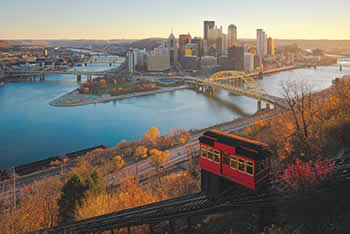FIELD TRIPS
Direct your field trip proposals to Joe Hannibal (NC) or Kyle Fredrick (NE).

1. Abandoned Mine Drainage in the Pittsburgh Area: Occurrence and Passive Treatment.
Cost: US$70, min 7, max 20. 9:15 a.m., Saturday, 18 March.
Bob Hedin, Hedin Environmental, info@hedinenv.com.
Description: The Pittsburgh Coal seam has been mined in western Pennsylvania for over 200 years. One common consequence of the mining is polluted drainage whose chemistry is controlled largely by hydrogeology. Unflooded abandoned mines produce low pH water while flooded mines discharge neutral pH water. These chemical conditions influence the environmental damage and the choice of treatment technologies. Both types of mine water exist in western Pennsylvania in close proximity to each other. This field trip will visit two local sites where polluted mine drainage from the Pittsburgh coal seam is being successfully treated with passive technologies. The tour will include two easy hikes, a picnic lunch, hydrogeochemistry, botany, and wildlife.
2. Induced Seismicity and Other Environmental Impacts of Shale Gas Development in Northeast Ohio.
Cost: US$35, min 6, max 15. 8 a.m., Saturday, 18 March.
Raymond Beiersdorfer, Youngstown State Univ., rebeiersdorfer@ysu.edu; John Williams, Buckeye Forest Council; Susan Beiersdorfer, Youngstown State Univ.
Description: This trip will highlight induced seismicity and environmental damage that has resulted from shale gas development in northeast Ohio. After departing Pittsburgh, attendees will observe an actively producing well site, injection well sites, and a cryogenic plant to process natural gas. Cost: US$35, min 6, max 15. 8 a.m., Saturday, 18 March.
3. New Insights and Lessons Learned from the Johnstown (Pennsylvania) Flood of 1889.
Cost: US$90, min 12, max 23. 8:30 a.m., Saturday, 18 March.
Carrie Davis Todd, Baldwin-Wallace Univ., cdavisto@bw.edu; Steve Lindberg.
Description: This trip will examine sites related to the Johnstown Flood, including the abutments of the South Fork Dam within the Johnstown Flood National Memorial, and a bridge built after the disastrous flood of 1889. Implications are based on the magnitude and details of the failure of the South Fork Dam.
4. Pleistocene Features of the Laurel Highlands and Upper Youghiogheny Basin.
Cost: US$80, min 25, max 50. 7:30 a.m., Saturday, 18 March.
Rebecca Kavage Adams, Maryland Geological Survey, rebecca.adams@maryland.gov; David K. Brezinski.
Description: Pleistocene features will be examined at three sites in the Appalachian Plateau region of Pennsylvania and Maryland. The trip begins in the Laurel Highlands at Mount Davis in southern Pennsylvania, known for polygonal patterned ground formed in periglacial conditions. The next two stops will be south into the Upper Youghiogheny Basin of Maryland. The first of these will be The Nature Conservancy’s Cranesville Swamp. This relict Pleistocene peat bog houses northern flora rare in this region and its pollen record offers a glimpse into climatic changes over the Pleistocene. The final stop is at the Snaggy Mountain periglacial rock maze in the resistant homewood sandstone of the Pottsville formation.
5. The Old, the Crude, and the Muddy: Oil History in Western Pennsylvania.
Cost: US$98, min 25, max 50. 7 a.m., Saturday, 18 March.
Kristin M. Carter, Pennsylvania Geological Survey, krcarter@pa.gov; Kathy J. Flaherty.
Description: This field trip will explore the rich oil history of western Pennsylvania. Stops will include the McClintock #1 Well, the Drake Well, and the Muddy Creek oil field. Both the geology of the Upper Devonian reservoirs tapped and the history of drilling and production at these sites will be discussed.
6. From Fort Pitt to Coal Hill: Geological, Archaeological, and Historical Aspects of Downtown Pittsburgh and Mount Washington.
Cost: US$28, min 5, max 25. 12:45–5:30 p.m., Monday, 20 March.
Joe Hannibal, Cleveland Museum of Natural History, jhannibal@cmnh.org; Albert Kollar, Carnegie Museum of Natural History; Ann Holstein, Case Western Reserve University.
Description: This walking trip will provide an introduction to the geological setting and cultural geology of Pittsburgh, with an emphasis on the use of local and imported geologic material and resources in the eighteenth and nineteenth centuries. The itinerary will include close views of the remains of Fort Pitt and its Blockhouse, the Diamond (Market Square), and the escarpment known as Coal Hill (Mount Washington) on the north side of the Monongahela River.